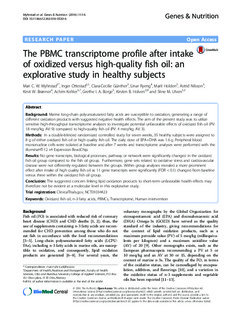| dc.contributor.author | Myhrstad, Mari | |
| dc.contributor.author | Ottestad, Inger | |
| dc.contributor.author | Günther, Clara-Cecilie | |
| dc.contributor.author | Ryeng, Einar | |
| dc.contributor.author | Holden, Marit | |
| dc.contributor.author | Nilsson, Astrid | |
| dc.contributor.author | Brønner, Kirsti Wettre | |
| dc.contributor.author | Kohler, Achim | |
| dc.contributor.author | Borge, Grethe Iren Andersen | |
| dc.contributor.author | Holven, Kirsten Bjørklund | |
| dc.contributor.author | Ulven, Stine Marie | |
| dc.date.accessioned | 2016-11-29T14:17:03Z | |
| dc.date.accessioned | 2017-08-24T13:12:03Z | |
| dc.date.available | 2016-11-29T14:17:03Z | |
| dc.date.available | 2017-08-24T13:12:03Z | |
| dc.date.issued | 2016 | |
| dc.identifier.citation | Genes & Nutrition 2016, 11:16 | nb_NO |
| dc.identifier.issn | 1865-3499 | |
| dc.identifier.uri | http://hdl.handle.net/11250/2451768 | |
| dc.description | - | nb_NO |
| dc.description.abstract | Background: Marine long-chain polyunsaturated fatty acids are susceptible to oxidation, generating a range of
different oxidation products with suggested negative health effects. The aim of the present study was to utilize
sensitive high-throughput transcriptome analyses to investigate potential unfavorable effects of oxidized fish oil (PV:
18 meq/kg; AV: 9) compared to high-quality fish oil (PV: 4 meq/kg; AV: 3).
Methods: In a double-blinded randomized controlled study for seven weeks, 35 healthy subjects were assigned to
8 g of either oxidized fish oil or high quality fish oil. The daily dose of EPA+DHA was 1.6 g. Peripheral blood
mononuclear cells were isolated at baseline and after 7 weeks and transcriptome analyses were performed with the
illuminaHT-12 v4 Expression BeadChip.
Results: No gene transcripts, biological processes, pathway or network were significantly changed in the oxidized
fish oil group compared to the fish oil group. Furthermore, gene sets related to oxidative stress and cardiovascular
disease were not differently regulated between the groups. Within group analyses revealed a more prominent
effect after intake of high quality fish oil as 11 gene transcripts were significantly (FDR < 0.1) changed from baseline
versus three within the oxidized fish oil group.
Conclusion: The suggested concern linking lipid oxidation products to short-term unfavorable health effects may
therefore not be evident at a molecular level in this explorative study.
Trial registration: ClinicalTrials.gov, NCT01034423 | nb_NO |
| dc.language.iso | eng | nb_NO |
| dc.rights | Navngivelse 4.0 Internasjonal | * |
| dc.rights.uri | http://creativecommons.org/licenses/by/4.0/deed.no | * |
| dc.title | The PBMC transcriptome profile after intakeof oxidized versus high-quality fish oil: anexplorative study in healthy subjects | nb_NO |
| dc.type | Journal article | nb_NO |
| dc.type | Peer reviewed | nb_NO |
| dc.date.updated | 2016-11-29T14:17:03Z | |
| dc.identifier.doi | 10.1186/s12263-016-0530-6 | |
| dc.identifier.cristin | 1364776 | |
| dc.relation.project | Nofima AS: 3613 | nb_NO |
| dc.relation.project | Norges forskningsråd: 225285 | nb_NO |
| dc.relation.project | Nofima AS: 201304 | nb_NO |

